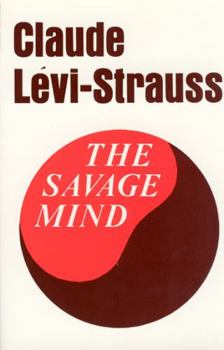The Savage Mind
Select Format
Select Condition 
Book Overview
A new translation of this classic work, titled Wild Thought (9780226413082 ) has replaced this edition and is now available. "Every word, like a sacred object, has its place. No pr cis is possible. This extraordinary book must be read."--Edmund Carpenter, New York Times Book Review "No outline is possible; I can only say that reading this book is a most exciting intellectual exercise in which dialectic, wit, and...
Format:Paperback
Language:English
ISBN:0226474844
ISBN13:9780226474847
Release Date:January 1966
Publisher:University of Chicago Press
Length:310 Pages
Weight:0.73 lbs.
Dimensions:0.6" x 5.3" x 8.0"
Customer Reviews
3 ratings
Ado About Much
Published by Thriftbooks.com User , 21 years ago
Academic scholarship does not generally lend itself to masterpieces. One tends to balance detail and complexity against efficiency, to narrow one's audience while deepening argumentation. Thus the truly great books of a particular discipline are often incomprehensible outside it, while the wonderfully accessible books rarely do more than describe what others have done.The Savage Mind is one of a small number of exceptions to this rule. In a book that requires no prior knowledge of anthropology, Lévi-Strauss succeeds in leveling a major challenge to his discipline and simultaneously to every reader. In elegant, graceful prose, he meticulously dissects his objects, formulates his arguments, and stretches the range of theoretical speculation to cover an extraordinary range of material from all over the world-including the modern.In the nearly fifty years since this book first appeared, however, much has changed. Structuralism, for which The Savage Mind served as something of a manifesto, has collapsed beneath the weight of its own logical formation and the critical assaults of various respondents-not all of them well-informed. But even that most scathing critic of structuralism, Jacques Derrida, has noted repeatedly that we can never really go back: structuralism is part of our thinking now, and the only way out is through. To put it simply, if you never read this book, you will never gain the right to criticize structuralism as a method for studying culture.Another thing that has changed is basic education. Lévi-Strauss takes it for granted that we all know quite a bit about European literature, music, and art; that we know who the painter Clouet was, and the difference between Mannerism and Impressionism. He doesn't assume expertise, but a kind of general cultural education no longer usual. This can make some of his analyses opaque, where they are intended to be illustrative. Just as you can skim these arguments, which are often problematic anyway, you don't actually need to know much about totemic practices to understand; he summarizes what's important, and so long as you don't intend to challenge through data, you need no background.Lévi-Strauss's arguments proceed methodically and exceedingly rapidly. Their weight lies in their logic, not their particulars; that is, it really doesn't matter whether his interpretation of any one myth or ritual is correct, but rather whether the means of going about it makes rigorous sense. He is not expert on everything, and he often inserts such phrases as, "Without presuming to decide this issue...." This is not mere qualification: he distinguishes between illustration of method and rigorous analysis of particular material. If you want him to analyze material, go read The Raw and the Cooked; if you want to know how he does it, read The Savage Mind.To put this differently, to pick on trivia here is to miss the point. Perhaps you do name your pets differently than he does. Perhaps the Murngin cr
The Manifesto of Structuralism
Published by Thriftbooks.com User , 22 years ago
hmmmm..... I can't see why this book has got such humble and unskilled review till now. This book is the easiest material to understand the tenet of structuralism. Personally I don't like the disposition of structuralism at all and I suspect whether in 50 years, anybody remember that kind of school existed at all except writers of history of philosophy. Anyway, this book made structuralism floating on the vogue with its ease to understand and constructed the intellectual fashion of structuralsim which dominated the whether of discourse in human science in the 1960s and 1970s. Yep. now nobody read Levi-Strauss, even anthropolgists don't read his books. But if you want to understand structuralism, post-structuralsim and postmodernism, you'd better begin with this book for it's the easiest and fun to read.
a mind provoking anthropology book
Published by Thriftbooks.com User , 24 years ago
This is the first anthropology book I read. It may be considered difficult to read this book. A scholarly and heavy description however very rewarding in my opinion. Spanning a real wide scope.





